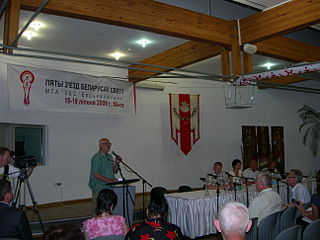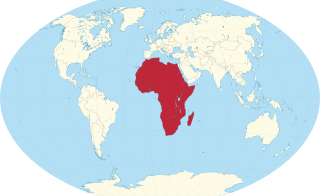
A diaspora is a population that is scattered across regions which are separate from its geographic place of origin. The word is used in reference to people who identify with a specific geographic location, but currently reside elsewhere.

The globalAfrican diaspora is the worldwide collection of communities descended from people from Africa, predominantly in the Americas. The African populations in the Americas are descended from haplogroup L genetic groups of native Africans. The term most commonly refers to the descendants of the native West and Central Africans who were enslaved and shipped to the Americas via the Atlantic slave trade between the 16th and 19th centuries, with their largest populations in the United States, Brazil, and Haiti. However, the term can also be used to refer to African descendants from North Africa who immigrated to other parts of the world. Some scholars identify "four circulatory phases" of this migration out of Africa. The phrase African diaspora gradually entered common usage at the turn of the 21st century. The term diaspora originates from the Greek διασπορά which gained popularity in English in reference to the Jewish diaspora before being more broadly applied to other populations.

The German diaspora consists of German people and their descendants who live outside of Germany. The term is used in particular to refer to the aspects of migration of German speakers from Central Europe to different countries around the world. This definition describes the "German" term as a sociolinguistic group as opposed to the national one since the emigrant groups came from different regions with diverse cultural practices and different varieties of German. For instance, the Alsatians and Hessians were often simply called "Germans" once they set foot in their new homelands.

The Japanese diaspora and its individual members, known as Nikkei (日系) or as Nikkeijin (日系人), comprise the Japanese emigrants from Japan residing in a country outside Japan. Emigration from Japan was recorded as early as the 15th century to the Philippines, but did not become a mass phenomenon until the Meiji period (1868–1912), when Japanese emigrated to the Philippines and to the Americas. There was significant emigration to the territories of the Empire of Japan during the period of Japanese colonial expansion (1875–1945); however, most of these emigrants repatriated to Japan after the 1945 surrender of Japan ended World War II in Asia.

The Polish diaspora comprises Poles and people of Polish heritage or origin who live outside Poland. The Polish diaspora is also known in modern Polish as Polonia, the name for Poland in Latin and many Romance languages.
This article details the geographical distribution of speakers of the German language, regardless of the legislative status within the countries where it is spoken. In addition to the Germanosphere in Europe, German-speaking minorities are present in many other countries and on all six inhabited continents.
Latin Americans are the citizens of Latin American countries.

The Greek diaspora, also known as Omogenia, are the communities of Greeks living outside of Greece and Cyprus.

The Italian diaspora is the large-scale emigration of Italians from Italy. There were two major Italian diasporas in Italian history. The first diaspora began around 1880, two decades after the Unification of Italy, and ended in the 1920s to the early 1940s with the rise of Fascist Italy. Poverty was the main reason for emigration, specifically the lack of land as mezzadria sharecropping flourished in Italy, especially in the South, and property became subdivided over generations. Especially in Southern Italy, conditions were harsh. From the 1860s to the 1950s, Italy was still a largely rural society with many small towns and cities having almost no modern industry and in which land management practices, especially in the South and the Northeast, did not easily convince farmers to stay on the land and to work the soil.

The Turkish diaspora refers to ethnic Turkish people who have migrated from, or are the descendants of migrants from, the Republic of Turkey, Northern Cyprus or other modern nation-states that were once part of the former Ottoman Empire. Therefore, the Turkish diaspora is not only formed by people with roots from mainland Anatolia and Eastern Thrace ; rather, it is also formed of Turkish communities which have also left traditional areas of Turkish settlements in the Balkans, the island of Cyprus, the region of Meskhetia in Georgia, and the Arab world.

The Dutch diaspora consists of the Dutch and their descendants living outside the Netherlands.
Europeans are the focus of European ethnology, the field of anthropology related to the various ethnic groups that reside in the states of Europe. Groups may be defined by common genetic ancestry, common language, or both. The total number of national minority populations in Europe is estimated at 105 million people, or 14% of 770 million Europeans in 2002. The Russians are the most populous among Europeans, with a population of roughly 120 million. There are no universally accepted and precise definitions of the terms "ethnic group" and "nationality". In the context of European ethnography in particular, the terms ethnic group, people, nationality and ethno-linguistic group are used as mostly synonymous, although preference may vary in usage with respect to the situation specific to the individual countries of Europe.

European emigration is the successive emigration waves from the European continent to other continents. The origins of the various European diasporas can be traced to the people who left the European nation states or stateless ethnic communities on the European continent.

The Bulgarian diaspora includes Bulgarians living outside Bulgaria and its surrounding countries, as well as immigrants from Bulgaria abroad.
The British diaspora consists of people of English, Scottish, Welsh, Northern Irish, Cornish, Manx and Channel Islands ancestral descent who live outside of the United Kingdom and its Crown Dependencies.

Brazil had an official resident population of 203 million in 2022, according to IBGE. Brazil is the seventh most populous country in the world, and the second most populous in the Americas and Western Hemisphere.
Nativism is the political policy of promoting or protecting the interests of "native-born" or established inhabitants over those of immigrants, including the support of anti-immigration and immigration-restriction measures. Despite the name, and in the US in particular, this position is usually held by the descendants of immigrants themselves, and is not a movement led by Indigenous peoples, as opposited to Nativists in Europe who are descended from native peoples such as Celts, Anglo-Saxons or Norsemen.

The French diaspora consists of French people and their descendants living outside France. Countries with significant numbers of people with French ancestry include Canada and the United States, whose territories were partly colonized by France between the 17th and 19th centuries, as well as Argentina and Uruguay. Although less important than in other European countries, immigration from France to the New World was numerous from the start of the 19th century to the middle of the 20th century. As of 2013, French authorities estimate that between 2 and 3.5 million French nationals are living abroad but the diaspora includes over 30 million people.

The Belarusian diaspora refers to emigrants from the territory of Belarus as well as to their descendants.

During the period of 1965 - 2021, an estimated 440,000 people per year emigrated from Africa; a total number of 17 million migrants within Africa was estimated for 2005. The figure of 0.44 million African emigrants per year pales in comparison to the annual population growth of about 2.6%, indicating that only about 2% of Africa's population growth is compensated for by emigration.



















